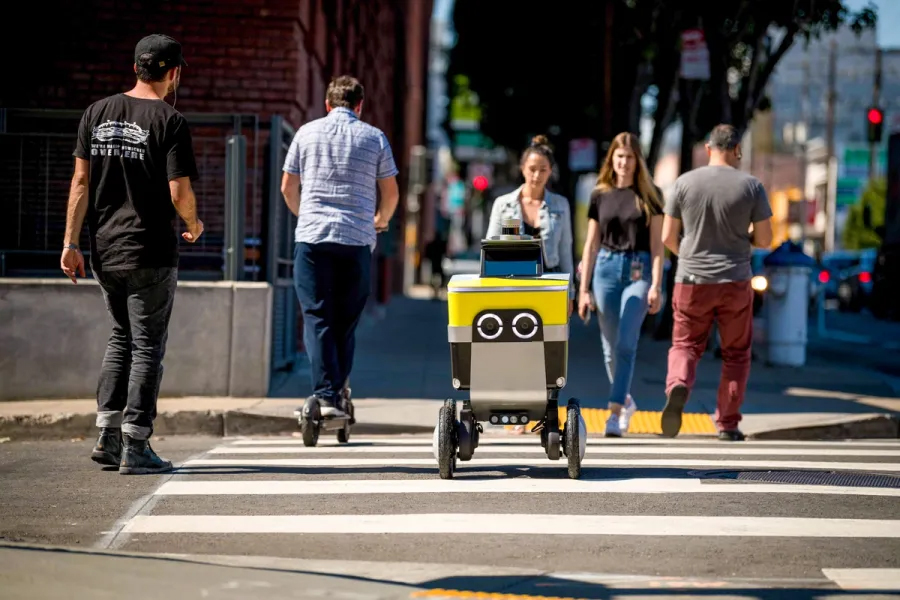These companies say they’re using robots to offer retailers cheaper and more sustainable delivery
When you navigate to Serve Robotics’ website, it poses an interesting question: “Why deliver two-pound burritos in two-ton cars?”
After briefly wondering if burritos are actually that heavy, you may realize the answer to the actual question lies simply in the fact that there aren’t too many other delivery alternatives (and we all know the economics for rapid delivery aren’t great).
But a crop of companies believe they’ve cracked the code, offering what they say are cheaper, less labor-intensive, and more sustainable ways to complete local deliveries: robots. While Serve and Nuro’s deployments have been on a smaller, regional scale thus far, the companies are continuing to scale with new partners like 7-Eleven and Uber Eats, and hoping to break through this year.
Roll with it: Serve was started by Postmates in 2017, using data from the food delivery company that found over half of deliveries cover less than a few miles and 90% were delivered in cars, “which is both not very sustainable, but also very expensive,” Serve Robotics CEO and co-founder Ali Kashani told us.
- Serve moved to Uber when it acquired Postmates in 2020, but spun out as an independent company in 2021.
Its autonomous four-wheeled sidewalk robots, with eye-like sensors making it look “like a Disney character,” Kashani said, can carry up to 50 pounds of cargo. The company claims it could eliminate over 1 billion car miles and more than 370k tons of CO2 annually.
A partnership announced last month with 7-Eleven, which participated in Serve’s 2021 funding round through its 7-Ventures, is a step toward that goal. Serve is providing the c-store delivery-as-a-service in Los Angeles, following a similar model as delivery services that use humans, so retailers don’t have to purchase robots themselves. Deliveries are typically completed in ~30 minutes, Kashani said.
The robots, which have a 99.9% fulfillment rate, require humans for maintenance and to oversee them in case they get stuck, but still can help retailers bring costs down, he noted.
“You’re able to leverage labor better,” he said, noting one person can oversee simultaneous robot deliveries instead of completing them one at a time themselves.
Street smarts: While Serve’s robots don’t stray from the sidewalks, Nuro’s autonomous vehicles are hitting the streets. Its vehicle, about ~20% smaller than a typical car, can carry 500 lbs, making autonomous deliveries for companies like Kroger, FedEx, Domino’s, and 7-Eleven with its sensor and camera-equipped vehicles. In September, Nuro struck a 10-year partnership with Uber.
Nuro, too, is hoping to address the crazy economics of delivering burritos using zero-emission vehicles that are powered by renewable electricity. “It costs more to move a burrito five miles than it does to make the burrito,” Cosimo Leipold, head of partnerships at Nuro, told us. “And there’s something about that doesn’t make a whole bunch of fun.”
- Because the average delivery distance is three to five miles, Leipold said Nuro’s vehicles offer a higher-speed service than even a sidewalk robot would.
All the news and insights retail pros need to know, all in one newsletter. Join over 180,000 retail professionals by subscribing today.
Since Nuro’s debut in 2016, it’s seen more partners switch from supplementing human delivery with its vehicles to relying on them as couriers have become harder to come by. “It’s a little bit less maybe about cost and a little bit more about the capacity, and the reliability that we can bring to partners,” he said. But the cost is big for consumers, he said, with consumer testing showing that those who didn’t want a robot to deliver their food actually changed their mind when they realized they didn’t have to tip it.
Next up, the company is considering turning its often “underutilized” second compartments on its vehicles into mini mobile retailers, upselling additional products like soft drinks to consumers.
Slow your roll: The streets have yet to be overrun by these delivery robots, and Kashani notes that financial and supply-chain demands mean that this tech will take some time to scale.
“It’s not something you build overnight. It’s not software; you can’t just press the button and have a million users,” he said. “You have to make sure that merchants want this, that customers want this, that this society wants it, so all of those things are problems that we are working with one step at a time.”
These startups haven’t been immune to the current macroeconomic conditions, either. Sidewalk robot competitor Starship laid off 11% of staff and closed select locations in June, while Nuro laid off 20% of its workforce in November. Still, Leipold believes these challenges could work to the company’s advantage given its promise to save retailers $$.
“[All of the macroeconomic challenges] are coming together to create this almost perfect storm of customer and retailer demand,” he said. “Consumers will want cheaper options, retailers need cheaper options, and we’re very well positioned to go after that.”
Source: Retail Brew




